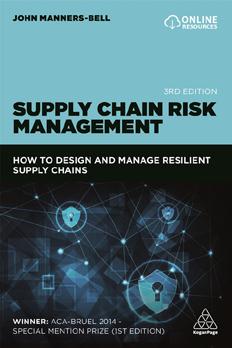
2 minute read
Supply Chain Risk Management
How to Design and Manage Resilient Supply Chains
Edition: 3 Date: 03/11/2020 Price: £49.99 ISBN Paperback: 9781789666373 ISBN Ebook: 9781789666380 Pages: 368 Format (mm): 235x156 Product Category: Textbook/Professional Subject: Risk Management
Author Information
John Manners-Bell is the CEO of Transport Intelligence, a leading supplier of market solutions to the global logistics industry. He is also Visiting Professor at the London Guildhall Faculty of Business and Law, London Metropolitan University. « The first edition, Supply Chain Risk Management, won the ACA Bruel Special Mention Prize in Paris for its contribution to the purchasing and supply chain industry « Explains key areas of supply chain risk management, such as cargo crime, climate change and cyber-crime « Provides case studies, such as Dell’s response to climate changes, the Port of Antwerp cyber breach and the Yemen Air Cargo Plot, to embed learning using applicable examples « New to this edition: a new chapter on ‘The threat of supply chain cyber crime’, additional case studies, the latest thinking on political risk as well as updates throughout « Online resources: lecture slides and example test questions
Description
From political uncertainty to trade disrupts and cyber threats, the risk environment is continuously evolving, and new challenges frequently arise demanding immediate attention to avoid disruption to supply chains. Supply Chain Risk Management is the guide to recognizing, reviewing and reacting to these risks to ensure continued operations and optimal service. This book is a practical learning tool which offers a comprehensive framework to understanding risk and how to engineer resilience into the supply chain.
The third edition of Supply Chain Risk Management details how to approach various threats, including black swan events, natural disasters, climate change, cargo crime and piracy, and terrorism and security. Using case studies and recent, topical examples, this book demonstrates how to successfully manage these risks and apply learnings in practice. Objectives, summaries and key point checklists in each chapter also help the reader grasp these key concepts and understand how to keep supply chains resilient. Online resources include lecture slides and example test questions.
Table of Contents
1 A framework for understanding risk 2 Engineering supply chain resilience 3 Industry sector resilience to supply chain threats 4 Natural disasters and pandemics 5 Climate change and emissions policy 6 Economic risks to the supply chain 7 Societal risks to supply chains 8 Corruption in the logistics industry 9 Cargo crime and piracy 10 The threat of supply chain cyber crime 11 Political risks in supply chains 12 Illicit supply chains 13 Terrorism and security










